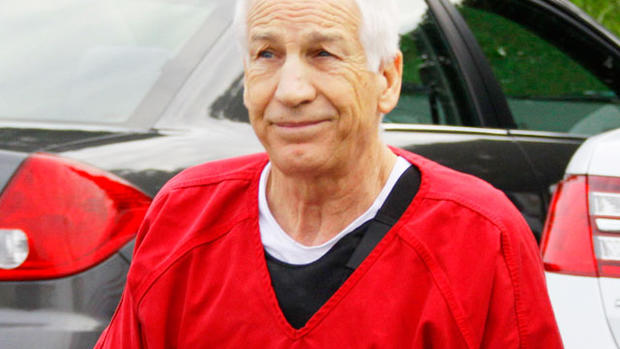Sandusky moved youth camps after campus ban
PHILADELPHIA - A former Penn State assistant football coach accused of sexually abusing boys held summer football camps at a satellite campus for six years after he was banned from taking youths onto the university's main campus by the athletics director and the senior vice president, who have been charged with failing to tell police about him.
Jerry Sandusky was prohibited from holding his youth sports camps on campus in 2002, the year a graduate student claimed to see him assault a child in a locker room shower. But Sandusky held the camps through his Sandusky Associates company from 2000 to 2008 at a satellite campus just outside Erie, Penn State Behrend spokesman Bill Gonda said.
"We provided the facilities for it," Gonda said Monday. "There were no allegations, no complaints during his tenure here."
Gonda referred questions about other issues, including whether the school knew about other allegations against Sandusky before allowing the camp to be held there, to officials at the main campus in State College, a four-hour drive southeast of Erie.
Video: Penn State officials surrender in sex abuse scandal
Alleged victims sought in Sandusky case
Paterno on abuse scandal: "We were all fooled"
School spokeswoman Lisa Powers said Penn State Erie and Penn State Harrisburg provided facilities for Sandusky to run a summer football camp under his own name. She said Penn State Erie runs about 14 to 18 summer camps in a variety of sports. She said the Sandusky camp was among numerous sports and academic camps that ran on campus.
The Sandusky camp was first reported by the sports website Deadspin.
Sandusky operated football camps not only at the Behrend campus but also at Penn State Capital College in Middletown, Robert Morris University and Muhlenberg College, among others, according to his website, which is now offline.
The camp was aimed at students from fourth grade through high school and offered personal attention and coaching from Sandusky, who retired from Penn State in 1999 after learning that he would not be head coach Joe Paterno's successor.
Sandusky has been aware of the accusations against him for about three years and has maintained his innocence, his lawyer said.
The athletics director back then, Tim Curley, and the senior vice president, Gary Schultz, surrendered to authorities on Monday to face charges that they failed to alert police to complaints that Sandusky had sexually abused eight boys and that they lied to a state grand jury investigating the former defensive coordinator.
A grand jury report released Saturday, after Sandusky was charged with sexually abusing eight boys over a 15-year period, makes various references to Curley banning him from taking children into the athletics facilities, the football building, the football locker room and the main campus.
A spokesman for the state attorney general's office declined to comment further on the ban.
Curley and Schultz stepped down from their posts late Sunday, with Curley taking a temporary leave and Schultz retiring. Their lawyers said they are innocent and will seek to have the charges against them dismissed. Schultz's lawyer said the men did what they were supposed to do by informing their superiors of the accusations against Sandusky.
The state police commissioner said Paterno fulfilled his legal requirement when he relayed to university administrators that the graduate assistant claimed to have seen Sandusky attacking a boy in the shower, but the commissioner questioned whether Paterno had a moral responsibility to do more.
Paterno, major college football's winningest coach, said he wasn't told "the very specific actions" contained in the grand jury report. He said in a statement that, if the allegations are true, "we grieve for the victims and their families."

